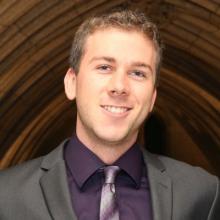Ryan van den Berg
What are your main responsibilities or activities in your current position?
Library of Parliament analysts provide custom research in response to parliamentarians' requests. We also directly support parliamentarians' work at committees. My team is primarily concerned with the federal government's spending and operations.
How does your current work relate to your graduate degree?
In any policy field, there is rarely a single, best solution to an issue. Researchers need to wade through the murky, "gray" areas to ensure that relevant actors can consider all of the relevant dimensions and make decisions based on competing perspectives. My graduate studies in the humanities trained me to critically examine real-world problems through a variety of lenses and forced me to ask the tough questions necessary to develop a critical outlook. Not only am I better prepared to understand the social, cultural, or political trends underlying a given issue, but I am more capable of articulating how these broader trends relate to tangible research subjects.
Is your current career path as you originally intended?
I have always dreamt of conducting research as part of my career, but I never imagined it would happen so soon after this stage in my studies!
What motivated you to pursue graduate work at UBC?
UBC, and particularly its Faculty of Education, have a strong reputation for academic excellence. I was also extremely fortunate to have worked with my top choice of supervisor, Dr. Claudia Ruitenberg, whose dedication to her students never ceases to amaze me.
What did you enjoy the most about your time as a graduate student at UBC?
I particularly enjoyed the autonomy I had as a Master's student. With the trust and guidance of my supervisor, committee, and faculty, I was able to pursue more creative research paths. This led to some of my strongest work yet and has opened quite a few doors to me.
What key things did you do, or what attitudes or approaches did you have, that contributed to your success?
I firmly believe that academia is not just a step toward a better career. At its best, graduate studies are an opportunity to reflect more deeply and discover new things about yourself and the world around you. I was fortunate to have space and time to determine which issues mattered to me and to figure out how I could better the world within that niche. In hindsight, I am glad I didn't focus too much on the "deliverables" most likely to land me a career. In fact, avoiding that outlook helped me develop a unique perspective that separates me from other job candidates. More importantly, this attitude kept me focused on the "service" component of education -- that is, using what I have learned to give back to those who stand to benefit most.
What is your best piece of advice for current graduate students preparing for their future careers?
Make sure you're able to communicate your academic work to the broader public. This means learning the skills and dispositions necessary to tailor an idea to the right audience, but it also requires you to reflect on why your work matters. Hopefully, this will sharpen your research while helping you avoid the parochial "ivory tower"!
How did you find out about/obtain your current position?
I spent the ten months following my Master's degree in the Parliamentary Internship Programme. In this programme, interns work in Members of Parliament's offices while conducting original research and sharing this knowledge with the public. During this time, I became more intimately aware of the Library's role and entered an internally-circulated job competition, in which was I fortunately successful!
